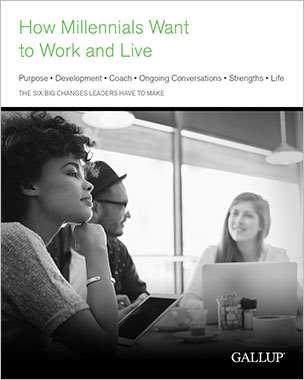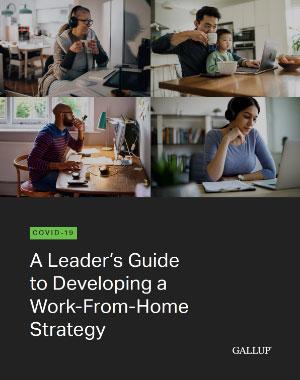Story Highlights
- Millennials are doing well with remote work
- Most millennials want continued flextime
- Managing remote workers is suddenly key to business success
Millennials have challenged business norms for a long time. As Gallup's pioneering research clarified, millennials don't see much distinction between their job and their life, they expect flexibility and work-life balance, and they will quickly bail on companies that don't meet their definition of a life well-lived.
Trying to adapt established workplace norms to millennials -- or adapt millennials to established workplace norms -- hasn't been easy or especially successful.
Millennials are the least engaged age cohort, show the most turnover and have the lowest rates of wellbeing. And at over 56 million individuals, millennials are also the largest generation in the U.S. labor force, so their workplace experience has an enormous impact on business outcomes. When it comes to work, what matters to millennials matters to everyone.
And then last March, almost overnight, millions of people started working remotely. The workplace suddenly offered all the flexibility and potential for work-life balance millennials ever wanted. In one fell swoop, business conformed itself to the millennial way.
To understand the gravity, it's important to recognize the scale. Since the onset of the pandemic, the number of days spent working from home has doubled across the entire workforce. The majority of remote workers are millennials: 52%, versus 29% of Gen Xers and 17% of baby boomers, Gallup data show. And almost half of all millennial employees, 46%, work from home.
Millennials flourish in the new remote work environment, with climbing wellbeing and employee engagement.
The pandemic brought a lot of employees into an environment that no one was prepared for -- except, you could argue, millennials.
They've been saying for years that they prioritize personal wellbeing, want greater work-life balance and are open to switching jobs to get what they want. So when the work world aligned with those needs by offering up remote work, millennials were ready. And, all things considered, they're flourishing.
When it comes to work, what matters to millennials matters to everyone.
Among millennials who work remotely, 54% have "thriving" wellbeing, compared with 47% among those who work on-site. For context, the average among all U.S. adults is 48.8%, a 12-year low according to Gallup data. Millennials are also far more engaged when they work remotely: 41%, versus 29% among those who work on-site.
And a whopping 74% of them don't want to go back to the office five days a week.
To be sure, millennials aren't the only ones who feel this way. Remote Gen Xers and remote baby boomers are more engaged and have better wellbeing as well, though to lesser degrees. And, in line with millennials, majorities of both Gen Xers (65%) and baby boomers (58%) would like to continue working remotely as much as possible even when the pandemic is over.
Which leaves leaders with a decision to make: Should these workers get what they want? Or do they need to go back to the pre-pandemic normal?
Evaluate positions for long-term remote work suitability.
Gallup's answer is: It depends. As part of our ongoing research into remote work -- an aspect of our workplace data analytics that became required reading in the world's C-suites last March -- we mined our database of 550+ jobs summarized into 35 roles across 20 industries to assess the impact of remote work on business outcomes before and during COVID-19.
The analysis showed that an optimal remote work role meets three criteria:
- Employees can perform their duties away from an on-site work environment.
- Most of the role's tasks and processes are inherently well-defined.
- The role does not require highly interdependent work for success.
Even when those criteria are met, the individual's success is highly dependent on the manager and the individual's capacity for remote work. So before a company makes any decisions about their telework future -- and six in 10 managers tell Gallup they intend to permit it post-pandemic -- leaders should understand the work conditions that enable success off-site.
It won't be possible to provide those conditions for every millennial. And 26% of remote millennials want to go back to working at the office as much as they used to.
But it is possible to create those conditions for all roles that do fit the criteria -- and for any employee who can flourish working from home -- by teaching managers to coach high-performance remote workers, designing the right structures for all types of teams, and devising work plans that amplify the productivity and engagement of teleworkers. Gallup does it for clients all the time.
Rigid workplaces aren't the millennial way.
Leaders need to be proactive about creating the conditions that enable extraordinary work, no matter where it's done.
Millennials aren't going to willingly re-embrace rigid workplace practices -- and when the economy is back to normal, they won't have to. Many companies are going 100% remote, and many more are expanding their capacity for it. That puts millennial workers closer than ever to an employee experience that meets their definition of a life well-lived.
It's going to be hard to put the genie back in the bottle when the pandemic is over, which leaves leaders with two choices: Either adapt the workplace to the needs of millennials, challenging as that is, or let them stay remote.
Design a remote work strategy that keeps your organization nimble:
- Contact Gallup. We'll help you design an approach focused on engagement and aimed at performance.
- Download our perspective paper, COVID-19: A Leader's Guide to Developing a Work-From-Home Strategy.
- Watch our webinar, "Key Considerations for a Successful Work-From-Home Strategy."






